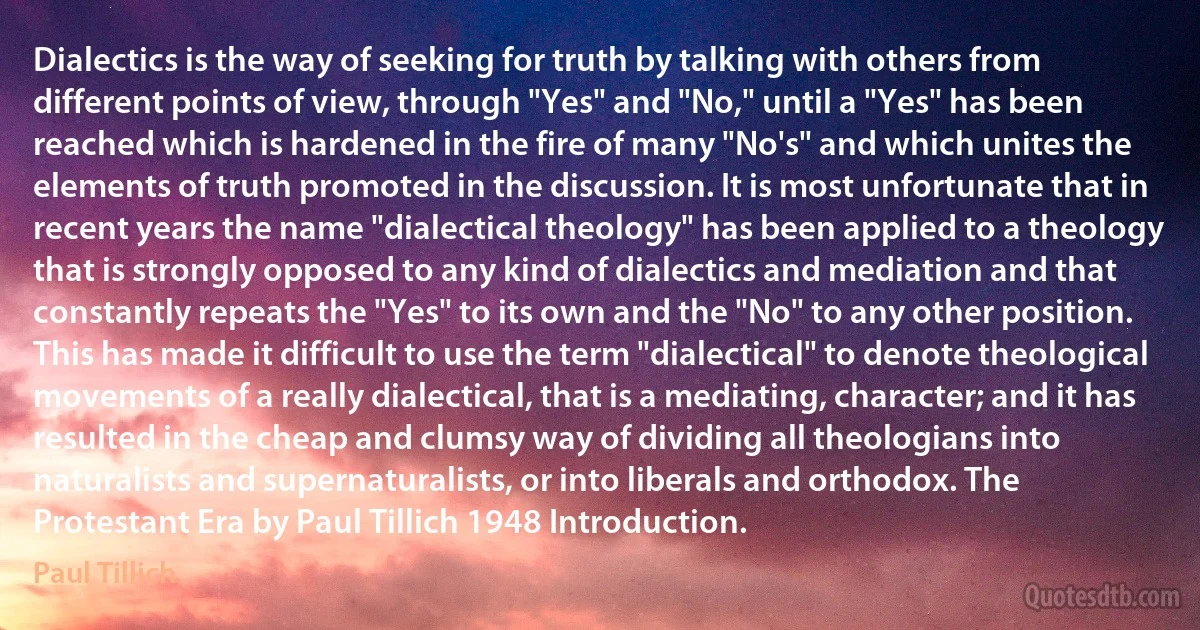
Dialectics is the way of seeking for truth by talking with others from different points of view, through "Yes" and "No," until a "Yes" has been reached which is hardened in the fire of many "No's" and which unites the elements of truth promoted in the discussion. It is most unfortunate that in recent years the name "dialectical theology" has been applied to a theology that is strongly opposed to any kind of dialectics and mediation and that constantly repeats the "Yes" to its own and the "No" to any other position. This has made it difficult to use the term "dialectical" to denote theological movements of a really dialectical, that is a mediating, character; and it has resulted in the cheap and clumsy way of dividing all theologians into naturalists and supernaturalists, or into liberals and orthodox. The Protestant Era by Paul Tillich 1948 Introduction.
Paul TillichRelated topics
character cheap dialectics different era fire kind mediation name orthodox position protestant seeking talking theology truth unfortunate use view way yes others years pointsRelated quotes
The advance of liberalism, so-called, in Christianity, during the past fifty years, may fairly be called a victory of healthy-mindedness within the church over the morbidness with which the old hell-fire theology was more harmoniously related. We have now whole congregations whose preachers, far from magnifying our consciousness of sin, seem devoted rather to making little of it. They ignore, or even deny, eternal punishment, and insist on the dignity rather than on the depravity of man. They look at the continual preoccupation of the old-fashioned Christian with the salvation of his soul as something sickly and reprehensible rather than admirable; and a sanguine and 'muscular' attitude, which to our forefathers would have seemed purely heathen, has become in their eyes an ideal element of Christian character. I am not asking whether or not they are right, I am only pointing out the change.

William James
A village in a country which is taking pains to become altogether standardized and pure, which aspires to succeed Victorian England as the chief mediocrity of the world, is no longer merely provincial, no longer downy and restful in its leaf-shadowed ignorance. It is a force seeking to conquer the earth... Sure of itself, it bullies other civilizations, as a traveling salesman in a brown derby conquers the wisdom of China and tacks advertisements of cigarettes over arches for centuries dedicate to the sayings of Confucius. Such a society functions admirably in the production of cheap automobiles, dollar watches, and safety razors. But it is not satisfied until the entire world also admits that the end and joyous purpose of living is to ride in flivvers, to make advertising-pictures of dollar watches, and in the twilight to sit talking not of love and courage but of the convenience of safety razors.

Sinclair Lewis
His speech is clumsy, with a toadlike indolence, long winded, pedantic, choppy. The words tumble from his mouth in sentence fragments, which he holds back as much as possible, as if they were earning interest. It takes forever and a day for him to push out a clump of hardened brain snot. Then he writhes in painful ecstasy, as if he had sugar on his rotten teeth. A very slow blab machine. An obsolete model with a non-working switch - it can't be turned off unless you cut off the electric power altogether. So I'd have to smash him in the kisser. No, I'd have to knock him unconscious. But even if he were unconscious he'd keep talking. Even if his vocal cords were sliced through, he'd keep talking like a ventriloquist. Even if his throat were cut and his head were chopped off, speech balloons would still dangle from his mouth like gases emitted by internal decay.

Klaus Kinski
Difficult as the course is, the dangers do not come from the difficulties; they come from extremists in India and at home. I will tell you what I mean. I am firmly convinced that such writings as appear in such papers as the Daily Mail will do more to lose India for the British Empire, will do more to cause a revolutionary spirit, than anything that can be done in any way by anyone else. I got many letters, I need hardly say, of all points of view. I had a very characteristic one last week... It was from a colonel; he was an old man, you could tell that by his writing; and he used this phrase: He said, "You and Lord Irwin are negrophiles." Perhaps he was a member of the United Empire party. That is not the way to cement the Empire. This sort of thing, and the spirit behind it, will break up our Empire infallibly, and that is what I am out to fight.

Stanley Baldwin
You have the opportunity to be more than spectators, you can be actors in the revolution, writing about it, expressing yourselves about it. And the generations to come, what will they ask of you? You might produce magnificent artistic works from a technical point of view, but if you were to tell someone from the future generation, 100 years from bow, that a writer, an intellectual, lived in the era of the revolution and did not write about the revolution, and was not a part of the revolution, it would be difficult for a person in the future to understand this. In the years to come there will be so many people who will want to paint about the revolution, to write about the the revolution, to express themselves on the revolution, compiling data an information in order to know what it was like, what happened, how we used to live.

Fidel Castro
